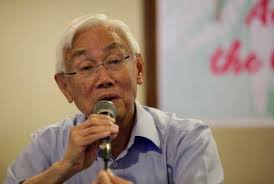By: InterAksyon.com
December 13, 2016 12:00 PM
InterAksyon.com
The online news portal of TV5
MANILA, Philippines — The former chief rebel peace negotiator took to task his erstwhile counterpart, Labor Secretary Silvestre Bello III, for “misrepresenting” his statement on their willingness to forge a bilateral ceasefire agreement by implying they were also willing to forego the release of political prisoners.
In a statement on Monday, Bello said: “I welcome the statement of Mr. Luis Jalandoni on the readiness of the National Democratic Front (of the Philippines) to sign a bilateral ceasefire agreement with the government even before the release of the political prisoners.”
At the same time, he gave assurances “the administration of President Rodrigo Duterte remains committed to the release of a substantial number of political prisoners.”
Recently, Duterte, while saying he remains committed to releasing around 150 of elderly, sick and nursing mothers among the more than 400 political prisoners, said he would not agree to free the rest unless the NDFP agrees to the bilateral ceasefire.
Reacting to Bello’s statement, Jalandoni, in his own statement, said the chief government negotiator “conspicuously omitted the NDFP’s position that any such agreement should take effect 48 hours after the signing, in keeping with the timeframe within which President Rodrigo Duterte said he would order the release of all political prisoners.”
When asked to clarify this, a member of the NDFP panel said it meant, “After the release of political prisoners, the bilateral ceasefire will take effect.”
In his statement, Jalandoni stressed that the NDFP “stands firm in its position that the release of political prisoners is first and foremost an obligation of the GRP (Government of the Republic of the Philippines) under signed agreements, particularly the CARHRIHL (Comprehensive Agreement on Respect for Human Rights and International Humanitarian Law) and the JASIG (Joint Agreement on Security and Immunity Guarantees), which the GRP has reaffirmed.”
He added that the release of the prisoners “cannot be reduced to a simple act of goodwill that the GRP can opt to take or not.”
“If the GRP is truly negotiating in good faith, it must release the political prisoners as a matter of commitment,” Jalandoni said.
At the same time, Jalandoni also warned that, even while they are helpful in building mutual trust and confidence between warring parties, ceasefires, whether unilateral or bilateral, “can also contribute to the erosion of goodwill when they are routinely violated,” referring to the alleged violations of the government’s unilateral ceasefire, as reported by human rights groups and various commands of the New People’s Army.
Jalandoni referred to “reports … pouring in from the field about relentless AFP (Armed Forces of the Philippines) and PNP (Philippine National Police) combat and intelligence operations victimizing rural communities.”
“The statistics this December are grim: 18 activists killed extrajudicially, with 20 others surviving attempts on their lives; more than 13,000 civilians victimized by forced evacuation; more than 14,000 cases of schools, clinics, chapels and other civilian infrastructure used as barracks by the AFP, all in violation of the CARHRIHL,” he added.
Lately, several NPA commands, notably in Mindanao and the Visayas, have warned that residents of communities where they operate have supposedly been clamoring for them to terminate the rebels’ own unilateral ceasefire because of continued harassment and threats by government forces.
Jalandoni said unless the government fulfills its commitment to release the political prisoners and orders the AFP “to be confined to barracks to show genuine reciprocity,” “it would be better for the NDFP to negotiate without the strain of having to deal with a deceptive and onerous ceasefire.”
